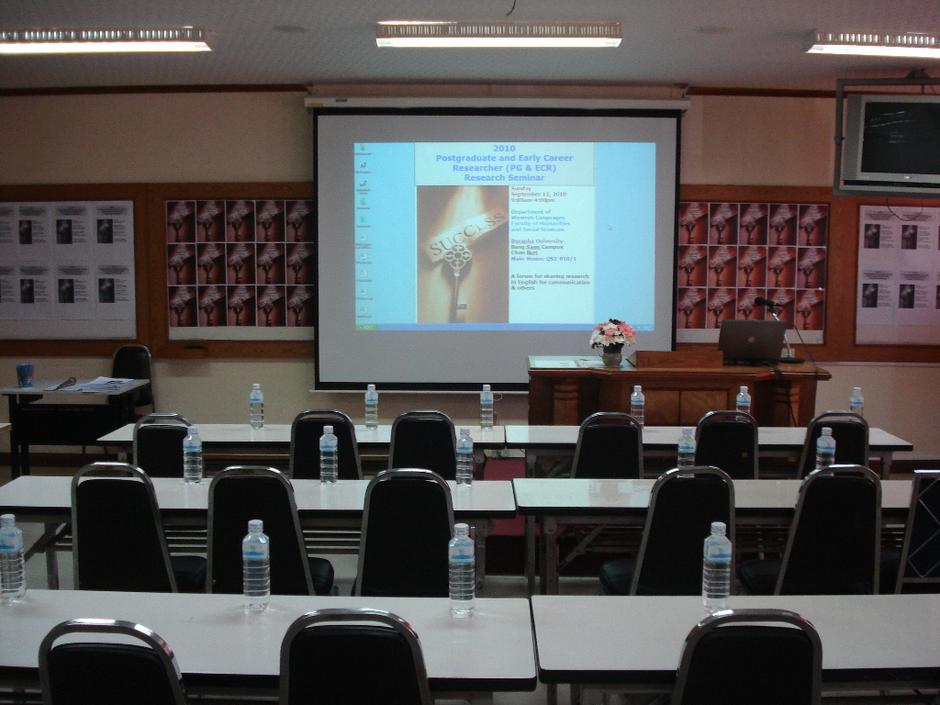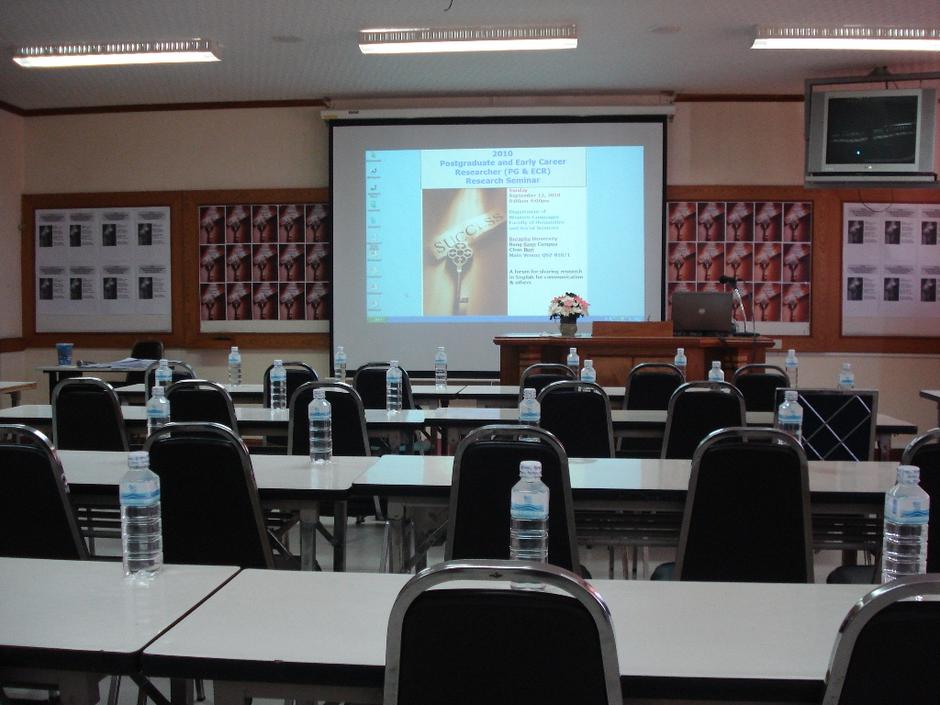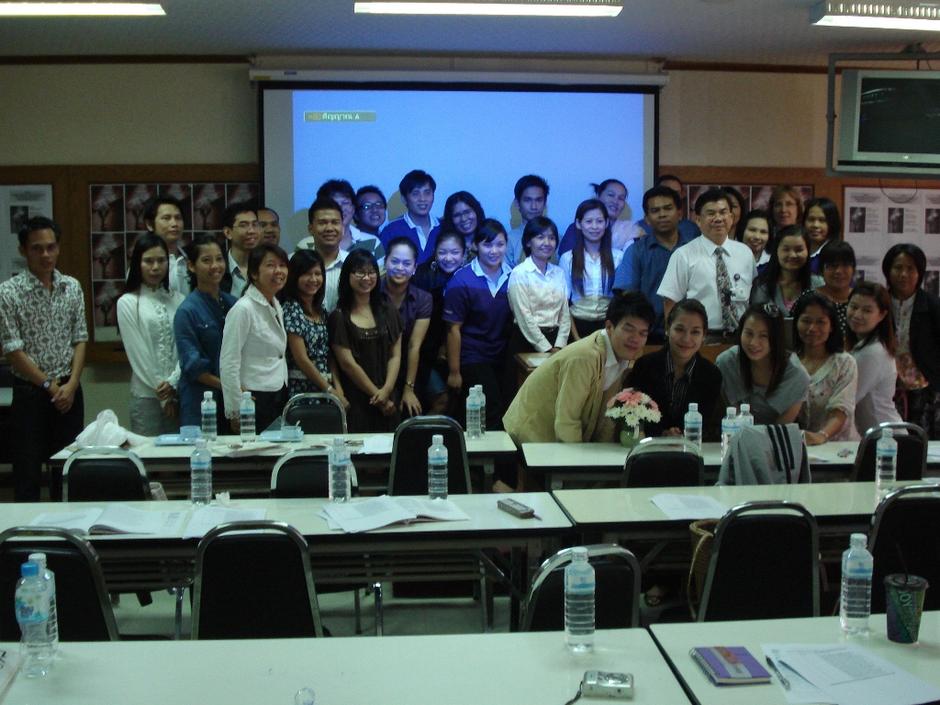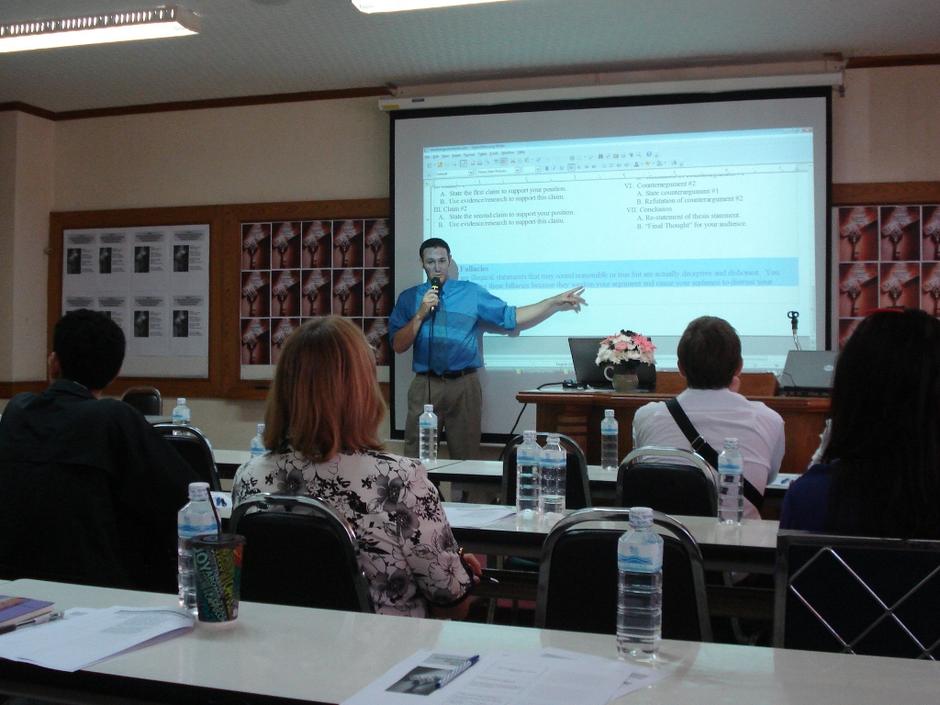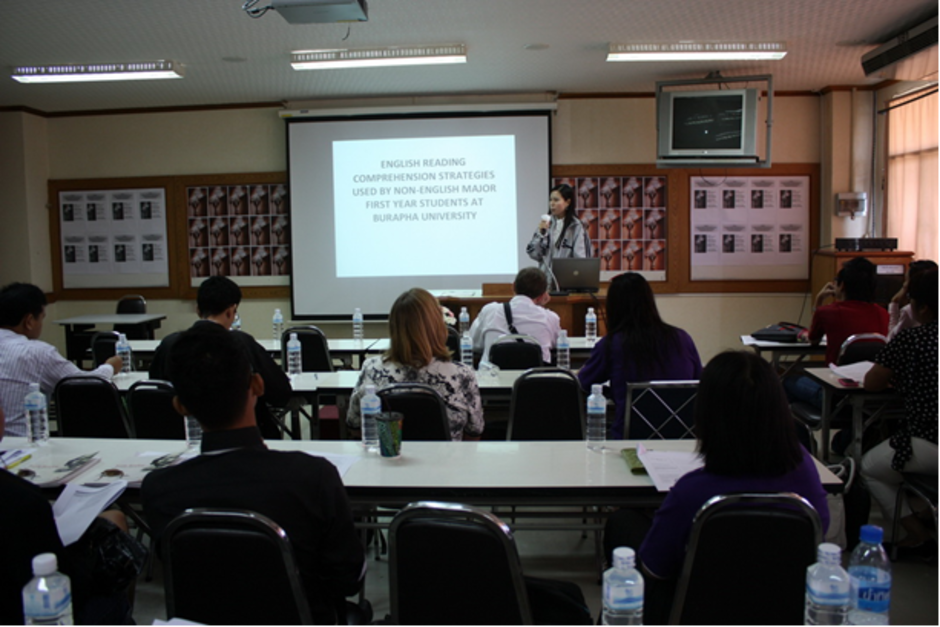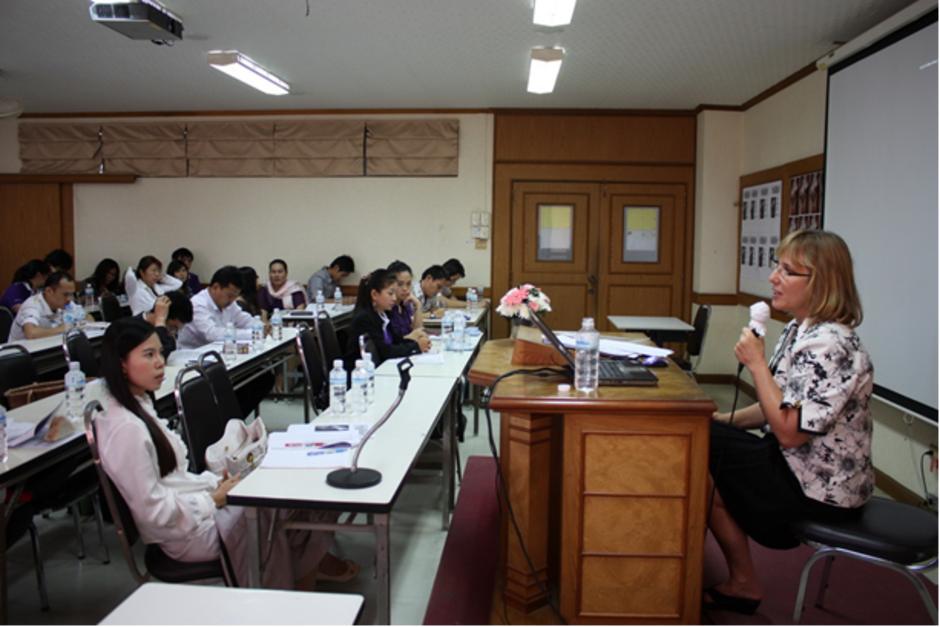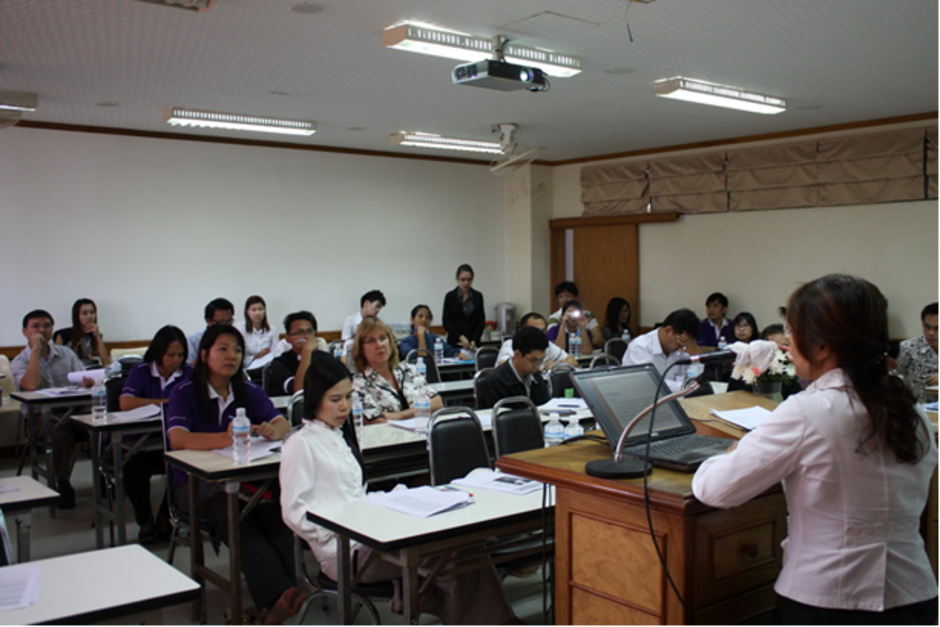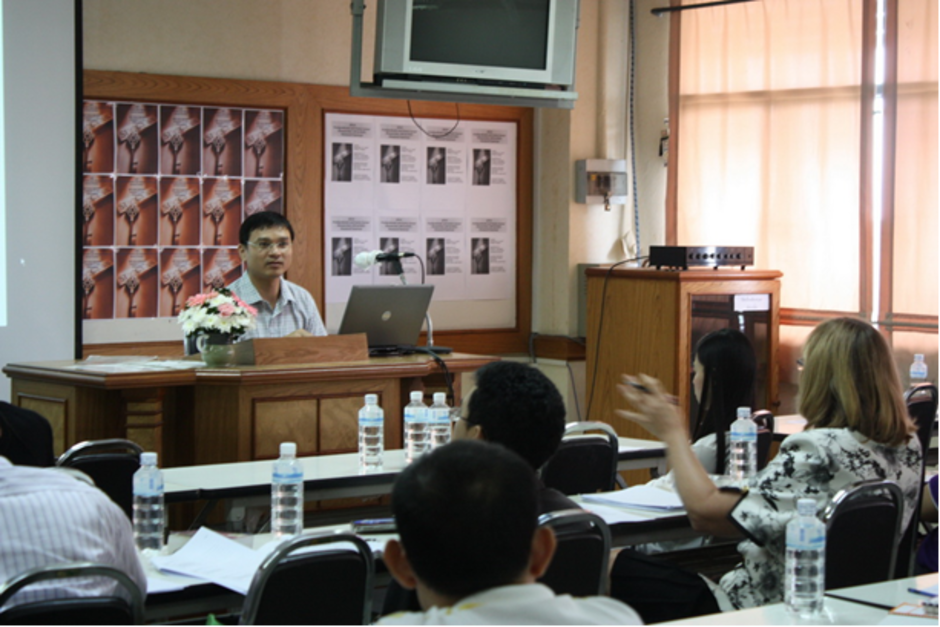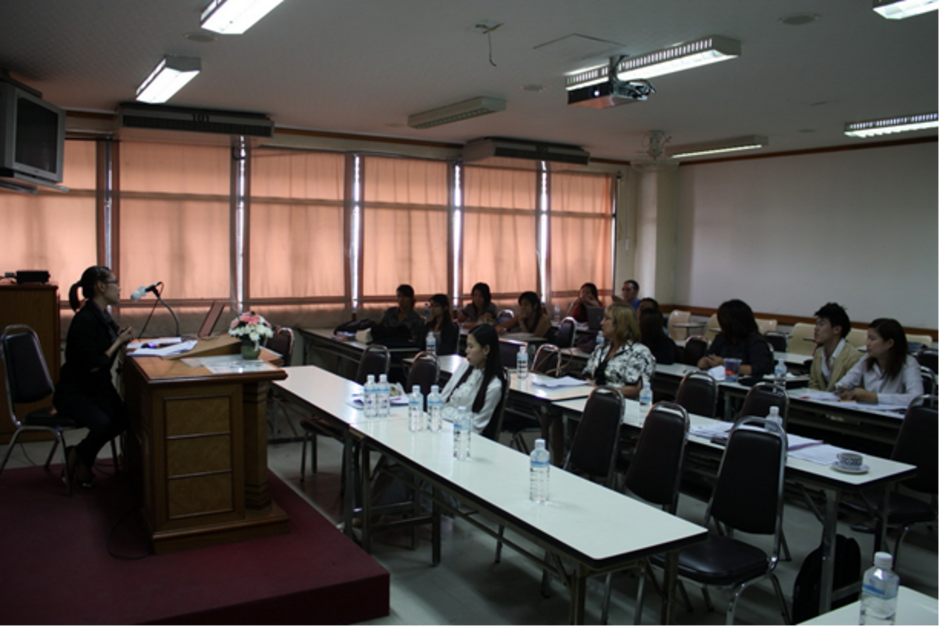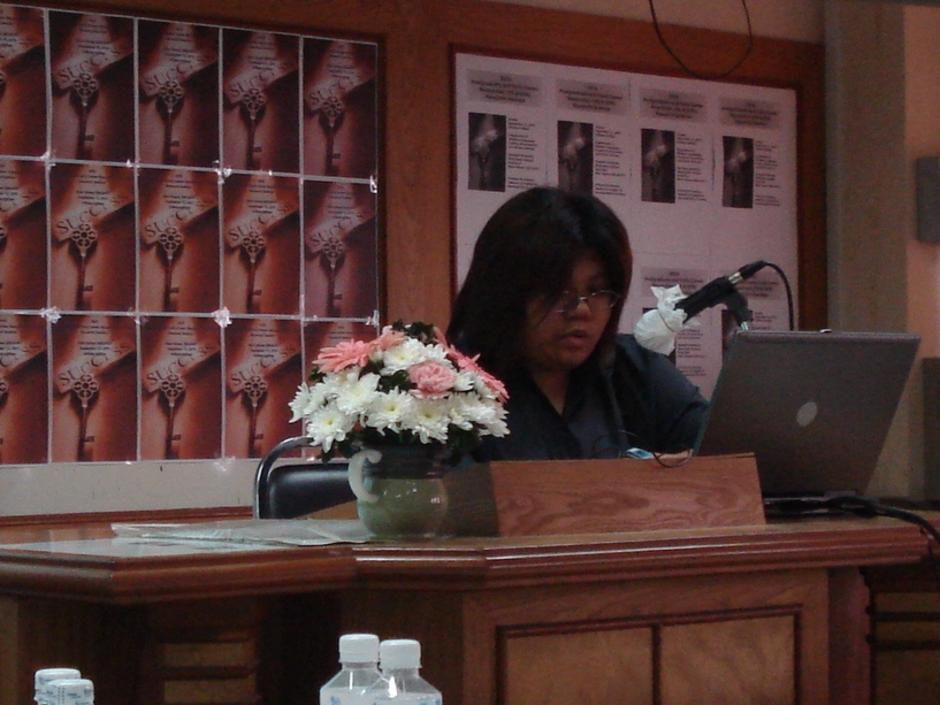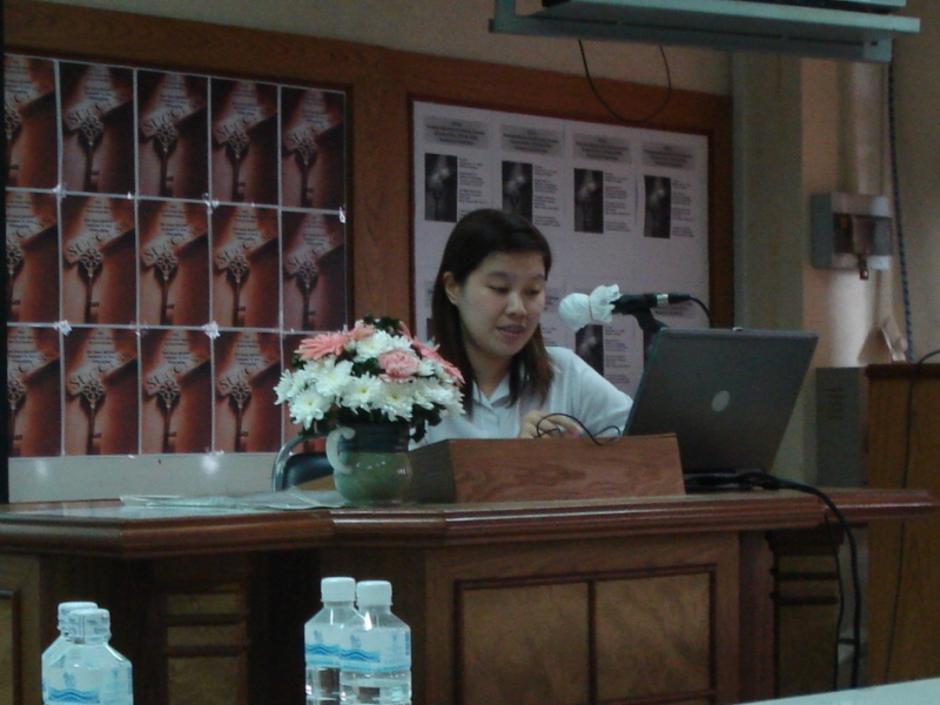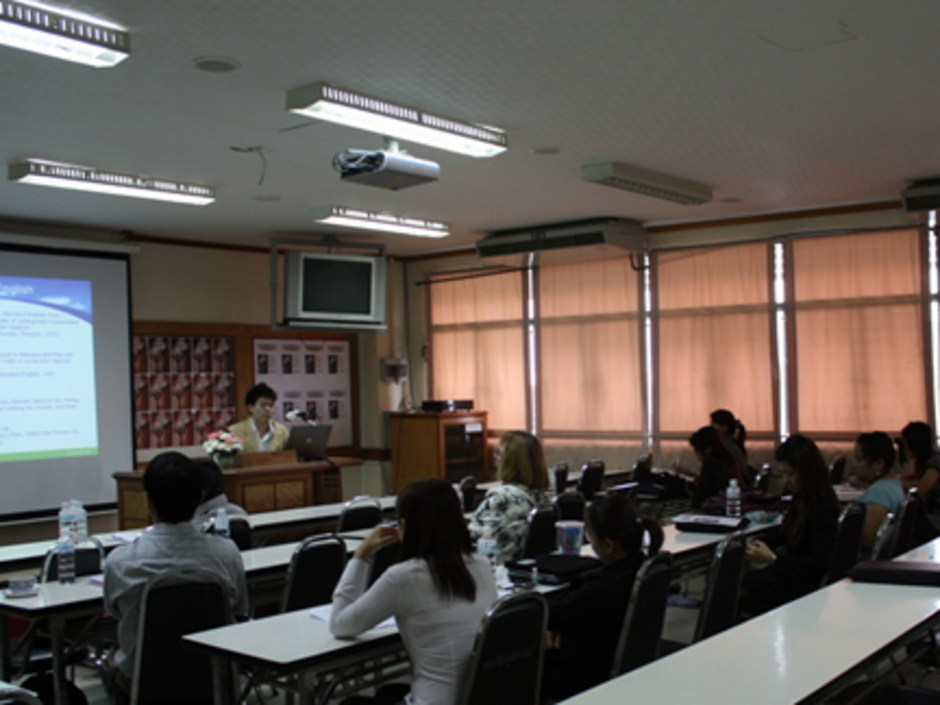2010 Postgraduate and Early Career Researcher (PG & ECR) Research Seminar
ภาพบรรยาการการสัมนา “2010 Postgraduate and Early Career Researcher (PG & ECR) Research Seminar” ที่พึ่งจะผ่านไปสดๆร้อน เมื่อวันอาทิตย์ ที่ 12 กันยายน 2553 ซึ่งได้รับความสนใจจากนักวิจัยทั้งชาวไทยและชาวต่างชาติ เป็นจำนวนมาก
โดยในการสัมมนาครั้งนี้ เป็นการเปิดโอกาสให้นักวิจัยทั้งหน้าเก่าและหน้าใหม่ ได้นำเสนอผลงานการวิจัยที่เกี่ยวข้องกับภาษาอังกฤษเพื่อการสื่อสาร โดยการนำเสนอผลงานเป็นภาษาอังกฤษ และเปิดโอกาสให้มีการซักถามแลกเปลี่ยนความคิดเห็นได้อย่างเปิดกว้าง
การสัมมนาครั้งนี้จัดขึ้นที่ห้องประชุม QS810/1 คณะมนุษย์ศาสตร์และสังคมศาสตร์ อาคาร 60 พรรษา มหาราชินี 2 มหาวิทยาลัยบูรพา จังหวัดชลบุรี โดยการสนับสนุนของ ผศ.ดร.อานนท์ ไชยสุริยา หัวหน้าภาควิชาภาษาตะวันตก และ ผศ.ดร.สมบูรณ์ เจตน์จำลอง อาจารย์ประจำภาควิชาภาษาตะวันตก มหาวิทยาลัยบูรพา จังหวัดชลบุรี
สถานการณ์ในโลกปัจจุบัน ภาษาอังกฤษมีส่วนสำคัญในการติดต่อสื่อสารกับชาวต่างชาติ ในด้านต่างๆ เช่น ความร่วมมือในการพัฒนาทางด้านวิทยาศาสตร์และเทคโนโลยี ความร่วมมือและการแข่งขันทางการค้า รวมไปถึงด้านการท่องเที่ยว ซึ่งล้วนแล้วถือเป็นกิจกรรมที่มีความสำคัญต่อการพัฒนาประเทศ และเป็นกิจกรรมที่สร้างรายได้หลักให้กับประเทศทั้งสิ้น
ดังนั้นการเรียนการสอนภาษาอังกฤษเพื่อการสื่อสารทั้งในระบบการศึกษาและนอกระบบการศึกษา จึงมีส่วนสำคัญในการพัฒนาบุคลากรของประเทศไทยเพื่อเตรียมความพร้อมทั้งในเด้านของความร่วมมือและด้านการแข่งขันกับชาวต่างชาติ ประเทศไทยยังมีความต้องการในการพัฒนาทางด้านนี้อีกมาก การสัมมนาที่เกี่ยวข้องกับการใช้ภาษาอังกฤษเพื่อการสื่อสารในครั้งนี้ จึงไม่ได้มีประโยชน์เฉพาะวงการด้านการเรียนการสอนเท่านั้น หากแต่ยังมีความสำคัญต่อทุกองค์กรและทุกภาคส่วน ที่มีความจำเป็นต้องใช้ภาษาอังกฤษเพื่อการสื่อสารอีกด้วย
ในการสัมมนาครั้งนี้มีผู้เข้าร่วมนำเสนอผลงานทั้งสิ้น 9 ท่าน ประกอบด้วย อาจารย์ประจำภาควิชาชาวต่างชาติ 2 ท่าน ชาวไทย 1 ท่าน นิสิตระดับปริญาเอก 1 ท่าน และ นิสิตระดับปริญญาโท อีก 5 ท่าน โดยมีผู้เข้าร่วมสัมนา เป็นอาจารย์ประจำและอาจารย์พิเศษของมหาวิทยาลัยบูรพา นิสิตระดับปริญญาโทและปริญญาเอก และบุคคลทั่วไป โดยมีหัวข้อที่ได้นำเสนอดังต่อไปนี้
1. “Argumentation and Logical Fallacies”
Mr. Bryan Breitung, Saint Louis University, USA
(Lecturer, Burapha University)
2. “English reading comprehension strategies used by non-English majors first year students at Burapha University”
Mrs. Laphatrada O'Donnell, Thammasat University, Thailand
(Lecturer, Burapha University)
3. “The implications of Thai English teachers' perceived English proficiency and efficacy”
Ms. Barbara Best, University of Idaho, USA
(Lecturer, Burapha University)
4. “Required Qualifications and Responsibilities of Journalists in the Bangkok Metropolitan Area”
Ms. Thantip Serintawat, Srinakharinwirot University, Thailand
(Lecturer, Bangkok University – Rangsit Campus)
5. “Needs analysis and problems in using English for communication of first line supervisors in Thai petroleum refineries”
Mr. Parinya Thongprapha, Rajabhat Institute Rambhaibharni, Thailand
(System Engineer, Esso (Thailand) Public Company Ltd)
6. “Exploring Problems in Using English for Communication of Police Officers in Pattaya City”
Ms. Sarinpit Promprasert, Kasetsart University, Si Racha Campus, Thailand
(Secretary, Spanish Place Pattaya Condominium)
7. “Influences of Age, Gender, and Experience on English Miscommunication of Communication Arts Students in Chandrakasem Rajabhat University”
Ms. Pattama Sumpantamitr, Chandrakasem Rajabhat University, Thailand
(Secretary, Chollahanpichit Irrigation Project)
8. “Problems in using English for communication of Thai employees in a global automotive company: A case study of AutoAlliance (Thailand) Co., Ltd.”
Ms. Kultida Areeraj, Huachiew Chalermprakiet University, Thailand
(Production Parts Purchasing, AutoAlliance (Thailand) Co., Ltd)
9. “An analysis in using English for communication of hotel receptionists in Pattaya city”
Mr. Jirat Wongvisuttikul, Assumption University, Thailand
(Business owner, Pattayasatcom Television Satellite Company)
More Pics : http://enbuu.net/ResearchSeminar/index.html
ความเห็น (12)
สุโค่ยยยย ^________^
ใช่แล้ว ชาลี
งานนี้สำเร็จได้ด้วยดีเกิดการร่วมมือกันของว่าที่นักวิจัยทั้ง 5 คนครับ ที่ต้องทำหน้าที่เป็น presenter และ organizer ในเวลาเดียวกัน หุหุหุหุ
ภายใต้การกำกับดูแลของ ท่าน ผศ.ดร.สมบูรณ์ เจตน์จำลอง อาจารย์ประจำภาควิชาภาษาตะวันตก มหาวิทยาลัยบูรพา นั่นเองครับ
ชาลีจัดสัมนาเมื่อไหร่บอกด้วยนะ จะไปร่วมเสนอผลงานด้วยครับ เหอะๆๆๆๆ
1. “Argumentation and Logical Fallacies”
Mr. Bryan Breitung, Saint Louis University, USA
(Lecturer, Burapha University)
The purpose of today’s seminar is to give a brief overview of how to make a good, well educated argument, with supporting evidence. Everyone here will be conducting research and applying theories to a specific study. English Masters and PhD. candidates must comply with academic standards by using well documented, expert data according to APA standards. This seminar will cover an essay argumentation format and logical fallacies.
When writing a dissertation, evidence and facts are paramount. Understanding where your data and research comes from is extremely important and must also be documented when doing research. An educated academic should realize the difference between sources being acceptable versus deceptive or dishonest.
2. “English reading comprehension strategies used by non-English majors first year students at Burapha University”
Mrs. Laphatrada O'Donnell, Thammasat University, Thailand
(Lecturer, Burapha University)
This study investigates the use and non-use of reading comprehension strategies reported by first year regular and special program students at Burapha University. There are 485 subjects participating in this study who are considered to have low-level proficiency in English, according to their English Ordinary National Educational Test (O-NET) scores, which range from 0 up to 45. The criterion is regulated by the Department of Western Languages, Faculty of Humanities and Social Sciences. The SPSS (Statistical Package for the Social Sciences) is used to interpret personal data by using frequency and percentage. Reading strategies will be analyzed by using mean, standard deviation, and percentage in order to show the presence and absence of reading strategies used during the pre-reading, while-reading and post-reading stages. Results indicate what strategies learners use and do not use for reading comprehension stages. The implications of these results can provide instructional frameworks for developing reading comprehension strategies in English reading. This study concludes with recommendations for future research in order to help students become more successful readers.
3. “The implications of Thai English teachers' perceived English proficiency and efficacy”
Ms. Barbara Best, University of Idaho, USA
(Lecturer, Burapha University)
Because research has shown that teacher’s high English proficiency and teaching efficacy can have positive effects on student achievement, this study will survey Thai English teachers to measure their teaching efficacy and proficiency levels and to see if their self-reported proficiency levels correlate to their self-assessed teaching efficacy. This quantitative-qualitative study will utilize a questionnaire and classroom observations to corroborate a small sample of teachers’ self-reported proficiency and efficacy assessment. The questionnaire will consist of three sections: closed-end questions to gather demographic information, a proficiency and teaching efficacy scale. This will be translated into Thai, with a focus on cultural sensitivity, to make sure that the participants understand the questions and statements. The Common European Framework Reference will be the tool used for the evaluation of proficiency and a modified version of the Teacher Efficacy Scale by Tschannen-Moran, Woolfolk Hoy and Hoy will be used to measure teachers’ efficacy levels. To corroborate the teachers’ self-assessed proficiency and teaching efficacy levels, classroom observations will be employed.
It may be that the results of this research will be drawn upon to create teacher development programs that promote the enrichment of teaching efficacy and proficiency in Thai English teachers.
4. “Required Qualifications and Responsibilities of Journalists in the Bangkok Metropolitan Area”
Ms. Thantip Serintawat, Srinakharinwirot University, Thailand
(Lecturer, Bangkok University – Rangsit Campus)
The purpose of the study was to examine the required qualifications and responsibilities of the journalists in the Bangkok Metropolitan Area. Multi-stage sampling included 284 samples in 4 groups: professional journalists (n=89), journalism educators (n=35), journalism students (n=70) and general public (n=90).
The results of the study in the first part about the professional journalists indicated that 64.04% had non-journalism bachelor degrees. Most of them were 26- 30 years old and had been working for 1-3 years. Their average incomes were 7,001-9,000 baht a month and 56.18 % of them had never worked in any other job before. They often consulted newspapers, journals, magazines, morgue files, text, news releases from companies and organizations, and slides and photographs for facts and information. They always accepted comments from executive editors, colleagues and readers or audiences. 40.44% of them agreed that the value of their work depended on news sources and 70.78% of them were satisfied with their jobs.
According to professional journalists’ and journalism students’ opinions, the most important required qualification of professional journalists was to be ethical information senders. But journalism educators and general public scored the importance on their knowledge and journalism skills. The most required qualifications of professional journalists, all groups except journalism students, thought they should have the courage to present the truth while journalism students wanted them to play a watchdog role for the society.
The second part of the study was about the trend of required characteristics of professional journalists in the future. Recommended qualities were (1) reliability (2) morality (3) curiosity (4) skepticism (5) friendliness & flexibility (6) IT usage and (7) foreign language ability. Recommendations for the trend of required responsibilities of professional journalists in the future were (a) abilities to report with new technology (b) being public intelligence (c) being public’s information sources (d) doing research and finding facts. Weaknesses of professional journalists were unethical, lack of freedom in performing their work, insecurity in life and property, lots of pressure, low incomes, etc. However, the number of professional journalists in the future would increase.
5. “Needs analysis and problems in using English for communication of first line supervisors in Thai petroleum refineries”
Mr. Parinya Thongprapha, Rajabhat Institute Rambhaibharni, Thailand
(System Engineer, Esso (Thailand) Public Company Ltd)
The purpose of this study is to investigate the needs and problems in using English for communication in the workplace. The sample will be first line supervisors who work in Thai petroleum refineries. The stratified random sampling method will be used to select the 196 research participants from six Thai petroleum companies. The instrument for data collection is a set of four-part rating scale questionnaires. Statistical applications used to describe the data are frequency distribution, percentages, standard deviation, and means.
The research expectation is to know the needs and problems of English for communication at the workplace over the four basic skills: listening, speaking, reading, and writing, and to explore the possible causes which significantly affect workplace communication of first line supervisors who work in Thai petroleum refineries. The results of this study may help related organizations to design appropriate work procedures to meet the needs of their employees. Moreover, this study can also raise the awareness of participants’ needs, which are important factors for designing a company’s English communication program.
6. “Exploring Problems in Using English for Communication of Police Officers in Pattaya City”
Ms. Sarinpit Promprasert, Kasetsart University, Si Racha Campus, Thailand
(Secretary, Spanish Place Pattaya Condominium)
The purposes of this study are to explore problems of the police officers in Pattaya city, pertaining to levels of communication problems in English language on listening, speaking, reading and writing skills, and needs for improvement of communication skills in English language. A questionnaire will be used to collect data for this study. The population in this research is 243 police officers in three Pattaya police stations, which are separated as follows: 168 local police (58 inspector police, 84 traffic police, 22 relations and communications police), 40 tourist police, and 38 immigration police. The results of this study can be used to develop and improve the police’s English communication skills for a more effective and efficient operation.
7. “Influences of Age, Gender, and Experience on English Miscommunication of Communication Arts Students in Chandrakasem Rajabhat University”
Ms. Pattama Sumpantamitr, Chandrakasem Rajabhat University, Thailand
(Secretary, Chollahanpichit Irrigation Project)
The purpose of this research is to study how age, gender, and experience influence to failure in communication or miscommunication on English between Communication Arts students in Chandrakasem Rajabhat University and English-speaking foreigners. The research questions are 1) Which factor—age, gender, or experience is the most influential in miscommunication with regarding to listening, speaking, reading, and writing? 2) How does the most influential factor—age, gender or experience influence on miscommunication in regards to listening, speaking, reading, and writing? The stratified random sampling method will be used to select 252 research participants from 734 third and fourth year Communication Arts students in Chadrakasem Rajabhat University. A closed-ended questionnaire with multiple-choice questions and five-point Likert scale items will be used as the research instrument. The statistics including percentage, mode, and means will be used to analyze research data. The research expectation is to identify the most influential factor that has an influence on miscommunnication of English. The results of this research will be proposed to related organizations to help improve the proficiency of students and to select a teaching method that is appropriate for students. Moreover, the research results can be extended to a large group of university students who may have similar problems.
8. “Problems in using English for communication of Thai employees in a global automotive company: A case study of AutoAlliance (Thailand) Co., Ltd.”
Ms. Kultida Areeraj, Huachiew Chalermprakiet University, Thailand
(Production Parts Purchasing, AutoAlliance (Thailand) Co., Ltd)
The purpose of this study is to investigate and explore the problems in using English for communication covering four skills -- speaking, listening, reading, and writing in the workplace of Thai employees who work in a global automotive company, AutoAlliance (Thailand) Co., Ltd or AAT. The participants are 72 employees from all four sections of the Purchasing Department: Production Part Purchasing, Non- Production Part Purchasing, Purchasing Planning Analysis, and Program Purchasing. They will be categorized according to their education level, work experience, and work position. The instrument for data collection is a questionnaire. The research expectation is to reveal the English communication problems in the workplace covering the four skills of Thai employees in the Purchasing Department at AutoAlliance (Thailand) Co., Ltd or AAT. The results of this study will offer suggestions to improve and develop English communication skills of Thai employees in the workplace and related organizations, so that they will be more effective and efficient.
9. “An analysis in using English for communication of hotel receptionists in Pattaya city”
Mr. Jirat Wongvisuttikul, Assumption University, Thailand
(Business owner, Pattayasatcom Television Satellite Company)
The purpose of this research is to analyze the quality of English for communication skills of 5-star hotel receptionists in Pattaya city. The goal is to use the results of the research to improve the skill levels of the hotel receptionists. The sample of the research comprises 30 conversations recording between receptionists and hotel foreign guests. The instruments in this research a questionnaire and an interview for collecting data. The statistical applications used in this research are the means and standard deviation.
Wow! Sound Interesting for all above mentioned topics. Happy New Year ka K. Rin :)
